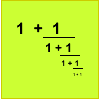Skip over navigation
In Miss Quaffley's class, one third of the pupils take a teddy bear to school.
Last term, each boy borrowed 12 books from the library, each girl borrowed 17 books, and each teddy bear borrowed 9 books.
In total 305 books were borrowed.
How many girls are there in the class?
If you liked this problem, here is an NRICH task that challenges you to use similar mathematical ideas.



Or search by topic
Number and algebra
Geometry and measure
Probability and statistics
Working mathematically
Advanced mathematics
For younger learners
Well Read
Age 14 to 16
ShortChallenge Level 





- Problem
- Solutions
In Miss Quaffley's class, one third of the pupils take a teddy bear to school.
Last term, each boy borrowed 12 books from the library, each girl borrowed 17 books, and each teddy bear borrowed 9 books.
In total 305 books were borrowed.
How many girls are there in the class?
If you liked this problem, here is an NRICH task that challenges you to use similar mathematical ideas.
This problem is taken from the UKMT Mathematical Challenges.
You can find more short problems, arranged by curriculum topic, in our short problems collection.
You may also like
Always Two
Find all the triples of numbers a, b, c such that each one of them plus the product of the other two is always 2.
Not Continued Fractions
Which rational numbers cannot be written in the form x + 1/(y + 1/z) where x, y and z are integers?
Surds
Find the exact values of x, y and a satisfying the following system of equations: 1/(a+1) = a - 1 x + y = 2a x = ay

